Sam Brown - Interview Part 1
by Nick Dent-Robinson
published: 24 / 2 / 2014
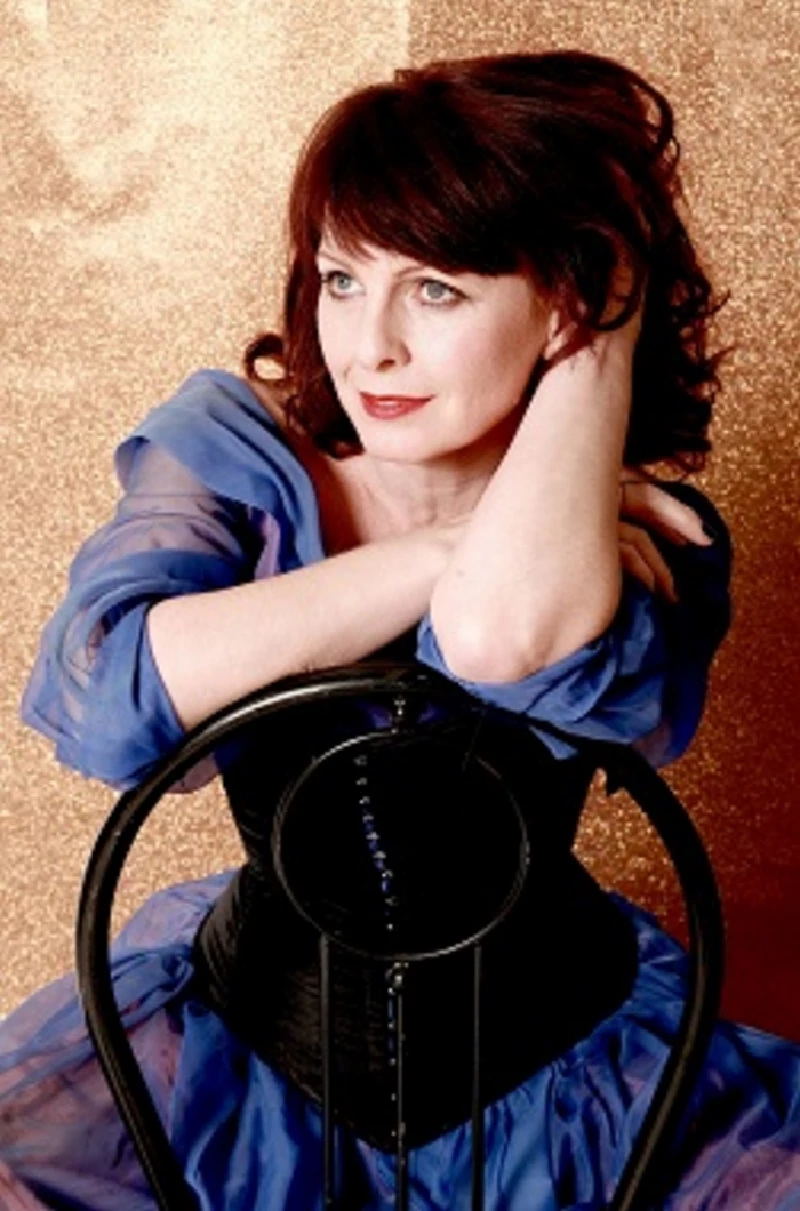
intro
In the first part of a two part interview singer-songwriter Sam Brown chats to Nick Dent-Robinson about her bestselling debut album 'Stop'...
Singer-songwriter Sam Brown has performed with the elite of the UK’s music scene since the late 1970s. Daughter of top 60’s guitarist Joe Brown and his vocalist wife Vicki, Sam had a major international success with her own composition ‘Stop’ in the late 80s. She has enjoyed a packed career since. This has included a world tour with Pink Floyd, years on the road as a lead vocalist with Jools Holland plus penning songs for some of the biggest names in the business. But a few years ago Sam had a cyst removed from her vocal chords and her voice has never fully recovered. In 2007 she released her album ‘Of the Moment’, but since then Sam has had to focus on non-singing activities. She has undertaken vocal tuition, worked at a florist's, produced records and written plus arranged a lot of music. For the last three years she has concentrated on teaching the ukulele. She now runs several large and hugely popular ukulele groups with well over a hundred enthusiastic players. The Fabulous Ukulele Club and the original International Ukulele Club of Sonning Common have featured on radio and TV and regularly perform at major festivals and other venues, including some international appearances. It has been a big success story for Sam. But in this interview Sam, who will be 50 later this year, takes the opportunity to reflect on her earlier career. She recalls some of the highlights from over thirty-five years of working with the world’s most renowned rock musicians. It is an early spring evening as Sam Brown welcomes me into her village home in rural Oxfordshire. Her hair is a rich chestnut colour with a touch of titian. It contrasts strikingly with her smiling blue eyes. Inside, the scene is a familiar one. Food is being prepared in the spacious kitchen; sophisticated music plays in the background; attractive artwork adorns the walls. There is the usual clutter of ordinary family life and the atmosphere is cosy and warm. Very Middle England. But Sam is not just your average 49 year-old householder. There is a hint of this from a guitar and ukulele resting in the corner of the lounge. Further evidence is the magnificent hand-bound book Sam passes me to look at while she serves the evening meal. For this is the commemorative album presented by Olivia Harrison to every artist performing at the 2002 ‘Concert for George’ at the Royal Albert Hall. Sam was the only solo female vocalist in the rock section of the concert. Eric Clapton was musical director and Jeff Lynne oversaw recording of the event, which took place one year to the day after George Harrison died in November, 2001. It was an historic occasion in rock’n’roll. “That was definitely a high spot of my career,” Sam tells me later as she settles in a comfy sofa with a glass of red wine. “I felt so honoured to be included. This event finally convinced me I had the respect of some of the greats of rock music, people I really admire. Eric and Jeff were so kind to me. Until then, despite all my achievements, I’d always lacked a little confidence.” The line-up was spectacular. As well as Eric Clapton and Jeff Lynne others included Paul McCartney, Ringo Starr, Dhani Harrison as well as Klaus Voorman, Billy Preston, Gary Booker, Albert Lee, Jim Capaldi, Ravi and Anoushka Shankar plus Jools Holland, who accompanied Sam. Although Sam had sung at the Albert Hall on at least thirty-five previous occasions, she was nervous. “But adrenalin provides the spur which can make a performance special, give it charisma. As soon as the music started I was fine,” she recalls. Sam’s dad, Joe, brought the concert to a close with the perfect finale. His rendition with ukulele of the standard ‘I’ll See You in My Dreams’ was unforgettable. As he played, red flowers started to fall from the ceiling over the whole auditorium. There wasn’t a dry eye anywhere. “It was a very emotional evening for all of us. The atmosphere was charged in a wonderfully warm, almost spiritual way. George had been one of my dad’s greatest friends. He was a very special person. He was spiritual but forthright and grounded, too. George was best man when dad remarried after my mum died. Dad was just so glad to have the opportunity to pay his respects by doing that song”. Besides her Albert Hall performances, Sam has been involved in quite a few historic high points in the music world. Barely into her teens, her first professional recording job was with her mother Vicki providing backing vocals on the last Small Faces album, ‘In the Shade’. Not much later and still in her young adolescence, Sam was to make her live singing debut with Steve Marriott and Ronnie Lane when they performed together as ‘Blind Drunk’ at the Bridge House pub in Canning Town, East London. “Yes, I did that with my foster brother Richard (Newman) who was even younger than me, playing drums! Dad was supposed to be there but couldn’t do it so we helped out. It was great. Fantastic East End atmosphere and others in the band drinking volumes of neat brandy!” “Steve had such a strong, rich voice as well as being so impressive instrumentally. He was always very nice to me, though I know he could be a nightmare sometimes.” Sam also sang backing vocals on the last recording George Harrison made, his composition ‘Horse to the Water’, which was later released on a Jools Holland album. Although terminally sick by then, George was somehow lifted by the music. “Somewhere upstairs I still have a mini-disc from that recording session with George chattering away. It was not long before George died,” Sam recalls. This was the song that Sam was later to sing at the ‘Concert for George’. Inevitably that performance brought back memories of recording it with George just over a year earlier. There have been numerous major charity and benefit events, too. These included Sam’s participation with Mick Jagger, Eric Clapton, David Bowie, Mark Knopfler, George Michael and Phil Collins in the first Prince’s Youth Trust concert in the mid-1980s. Subsequently Buckingham Palace invited Sam to sing for the Queen at the Golden Jubilee and she has been involved in a variety of other royal occasions over the years, often with Jools Holland. And when Tony Blair was hosting his first G8 summit in Birmingham in May 1998, Sam was again invited to sing with Jools Holland’s big band. The leaders of the world’s eight most powerful countries were present. Afterwards Bill Clinton came over to the band to present Sam with a yellow rose. She accidentally dropped the flower and, to the amusement of others in the band, President Clinton reached down to pick it up and present it a second time. Later tales circulated of the President seeking out Sam’s phone number with a view to inviting her to perform in Washington. The suggestion was that the US Embassy in London vetoed this. Possibly because the Monica Lewinsky scandal was then at its peak. Sam cackles with laughter but firmly denies all knowledge. Diplomatically, she adds, “I was impressed, though, with how charming Bill Clinton and Tony Blair both were. Very pleasant, but it was all a bit of a blur”. Sam pauses a moment as she sips her wine. Then, with a grin, she quickly brings things right down to earth by adding, “Mind you, it was not my best moment personally. I had not long had my second child and I wasn’t keen to perform there. But Jools insisted I do it, overweight, leaky breasts and all! From what you say, it sounds like I got away with it as far as Mr Clinton was concerned.” Sam also featured in Pink Floyd’s ‘The Division Bell’ tour in 1994. It was nine months and covered most of the USA plus twenty-five other countries, playing Earls Court as well as many of the world’s major stadiums. She recalls, “It was hard. I told Dave Gilmour I’d have to take my daughter Vicki with me as she was just six months old.” That must have been difficult? “She was a happy baby. But the point was, Dave had asked me to do a few tours before and I’d always had to turn him down which was an incredibly difficult thing to do. I mean, I turned down Pink Floyd at least three times. Can you imagine? And I love Pink Floyd and like Dave, so I really wanted to do it this time.” The way Sam sings with Pink Floyd is pretty demanding. It must have been hard on her voice, night after night? “It was. I’m amazed I got through it. At that time I’d had no voice tuition whatsoever. Later, after I’d had my second child I became exhausted and lost my voice. I went to have singing tuition in Glasgow and the difference was remarkable. With a few new techniques I could sing anything, twelve nights in a row.” Sam first sang at the Albert Hall when she was just 16. It was a Colombian charity event with David Gilmour. She remembers being petrified and wanting to turn and run off the stage. The performance went well, though. Among Sam’s many Albert Hall appearances since then were a benefit concert for Ronnie Lane where she sang with Paul Weller and other occasions with Deep Purple and Pink Floyd. Plus the annual Jools Holland event when the whole auditorium would be turned into a gigantic pub. Sam suddenly recalls another time with Deep Purple in Hamburg. “We’d all had a few drinks. The Beautiful South were there too. I don’t remember why, but Ian Gillan and I ended up swapping clothes. He looked good in my dress. But you know it never ever smelled quite the same again! I don't want to bore you with too many of those old rock and roll stories though.” We talk more about her work with Jools who has described Sam as “without question, one of the greatest singers I’ve ever worked with”. “Jools and I met on a TV show called ‘The Happening’ in 1989, or was it 1990? We have a close relationship musically, and I do have great respect for what he has achieved. I have learned a lot from him. Working with Jools has enabled me to perform with such an incredible range of talent. Sometimes it is all a rush and there doesn’t seem enough time to prepare as I would like to. But that kind of pressure working with class performers does raise your game. I always enjoyed singing backing vocals too. People used to say to me I shouldn’t do that, shouldn’t lower myself, but I loved doing it. I think you can learn a lot from any performance with others and I never really gave a toss whether people thought I shouldn’t do it! “For me music is a learning process. There’s so much to take in and absorb. And when you meet and work with people like Solomon Burke or Dr John or B.B. King or Robert Plant who have been around a bit and seen so much, you really gain. These people are always learning too - looking around, soaking things up. It is the same with writing songs. There are so many different ways of doing it, new approaches. It is constantly challenging which is one of the things I love about music.” Sam has written with Jools Holland too. “Yes, I enjoyed writing songs with Jools. I was lucky to be able to do that. He is great musically but also a skilled lyricist. Together we have written for Chrissie Hynde, Sam Moore, Nick Cave, Edwin Starr, Dionne Warwick as well as a song for the Dawn French film, ‘Milk’. And once we did a song for Ray Charles, though he died before he was able to make the record. Later Paul Rodgers recorded it. I believe ‘Valentine Moon’, which Jools and I wrote together, was featured on ‘EastEnders’. The Jools album the song appeared on reached the UK Top Ten in 2007.” Outside the music industry many are unaware how prolific and successful Sam Brown has been as a songwriter. She has written with Jon Lord of Deep Purple for his solo albums, and has had scores of her songs recorded. In 2004 Jamelia released her own version of ‘Stop’, which was featured in the second Bridget Jones film. Why don’t more people associate the name Sam Brown with songwriting? “I don’t understand why that has never come across. Maybe it’s because of the way ‘Stop’ was marketed? The platinum hair and so forth. You know, the dumb blonde.” The Monroe-style image? “I was okay with that. But I hated some of the nonsense that went with it. I wasn’t really that comfortable with myself back then. Didn’t feel I looked good at all and hated having my photo taken. I’d never have had the confidence to do what some of the young women do now! But I didn’t mind the Monroe look. In fact a while ago I did a photo-session which included a copy of a Monroe photograph and it was really nice to do.” When did Sam start writing songs? “As far back as I remember music was one of the most important things in my life. I always wanted to write songs. I’d had piano lessons from age five. My teacher was tough. She had a ruler with a brass edge and used to rap my knuckles if I didn’t hold my wrists high enough to allow a mouse to run underneath, as she put it. In truth I didn’t learn much from her. It was my dad who put me on the right track by introducing me to Scott Joplin. If you can master his tunes then it is an introduction to playing stride piano.” “As I had a good ear, it was a short step from playing to composing tunes and adding lyrics. Or sometimes writing the lyrics and putting them to music. I was quite a solitary child, and from the age of 13 I spent a lot of time in my room working on songs. Even then I used to try to avoid the worst clichés of love songs. I was fascinated by words and their meanings and rhythms. At school English was a favourite subject, and even today I enjoy crosswords.” Hundreds of successful compositions later, has Sam’s song-writing method changed? “Not much, really. Though I compose on the ukulele now, rather than the piano. What often works best for me is when I have the basic concept for the lyric and then find a melody, fine-tuning the words to get the best fit. But there’s no hard and fast rules. Sometimes a song just comes, which is what happened with ‘Stop’, as I was driving down the Pacific Highway near Los Angeles one day. I was 19, spotty, wearing dungarees, a beret and Doctor Martens and I loved it there. My record company had asked me to go out to California for a few months to do some writing. I didn’t fit in, though and I didn’t really go down that well. Hardly your typical Southern Californian beach babe, was I? But I did write some good songs and ‘Stop’ was one of them.” The top photograph that accompanies this article was taken by Stephanie Dray, and the middle photograph by Vicki Rose Evans.
Band Links:-
http://www.misssambrown.comhttps://www.facebook.com/MsSamBrownSinger
https://en.wikipedia.org/wiki/Sam_Brown_(singer)
Picture Gallery:-
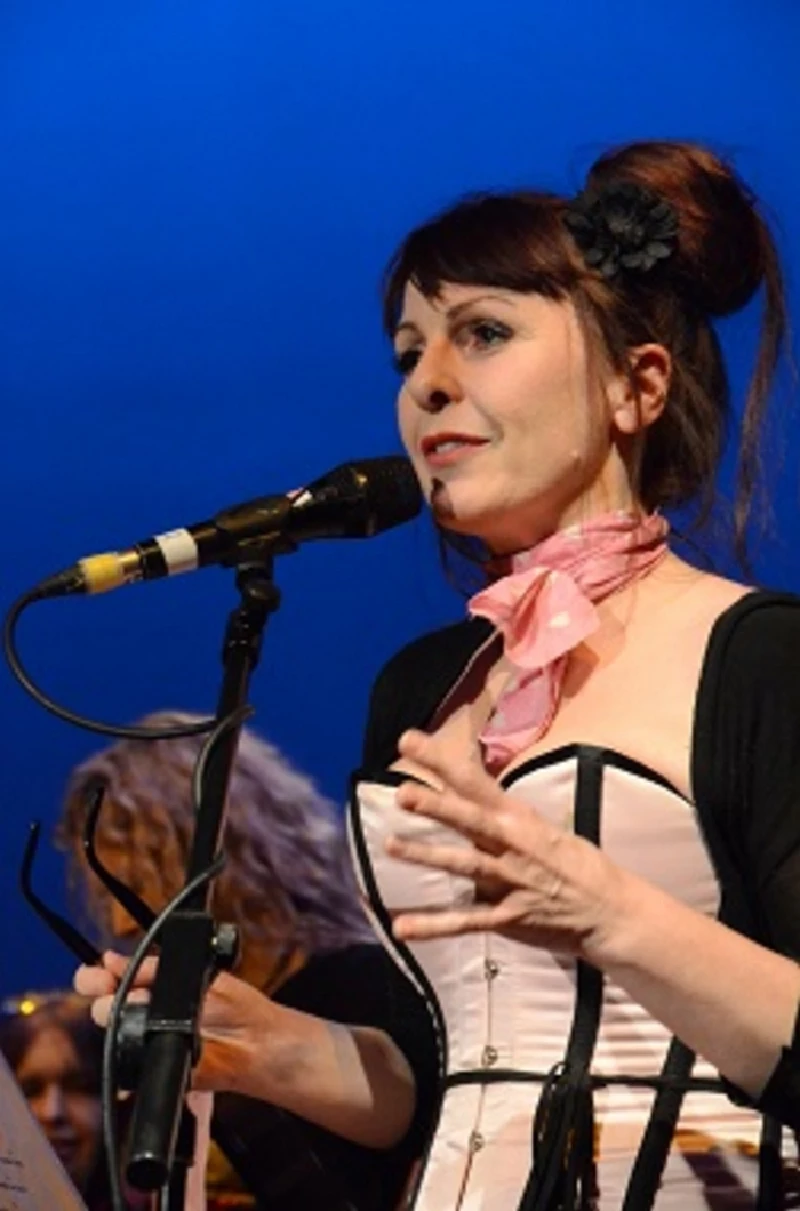
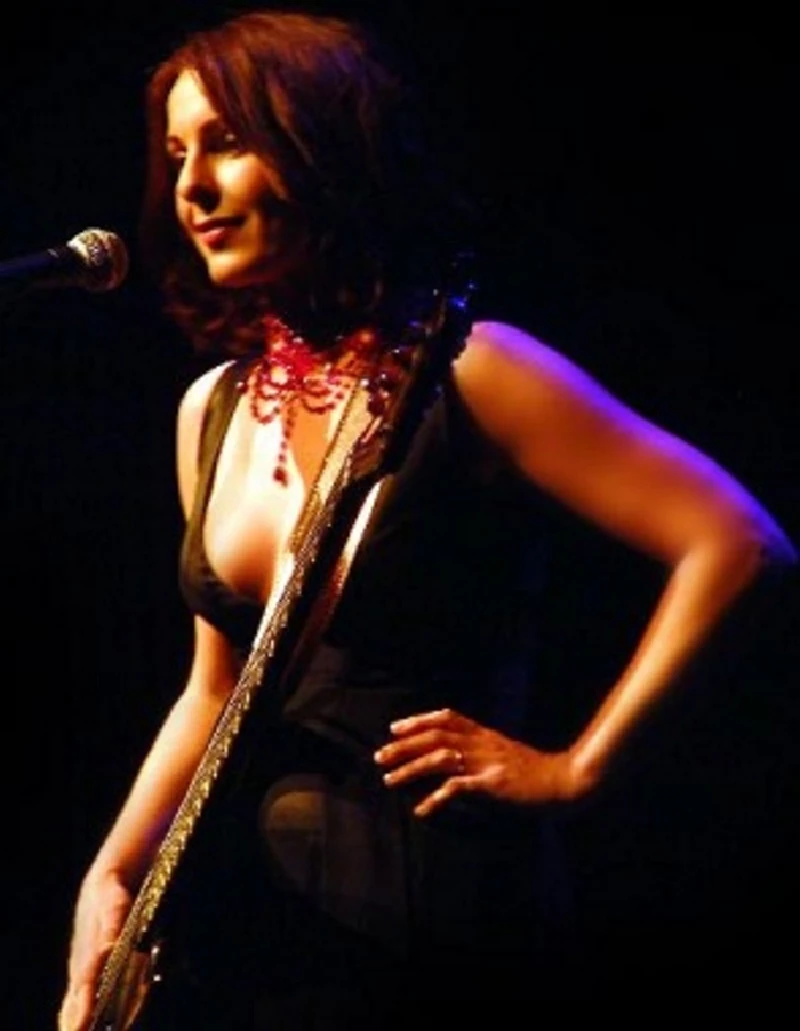
interviews |
|
Interview (2023) |
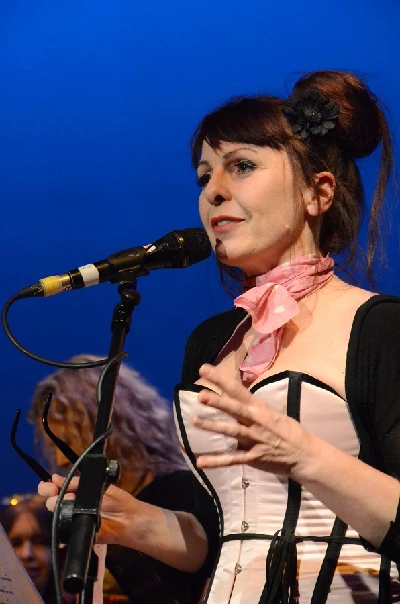
|
| Acclaimed singer-songwriter Sam Brown talks to Nick Dent-Robinson about her eighth album, ‘Number 8’, which, despite the permanent loss of her former singing voice, was recorded with the aid of new technology. |
| Interview 2008 (2021) |
| Interview (2014) |
| Interview Part 2 (2014) |
| Interview (2012) |
live reviews |
|
Kenton Theatre, Henley on Thames, 9/12/2016 |
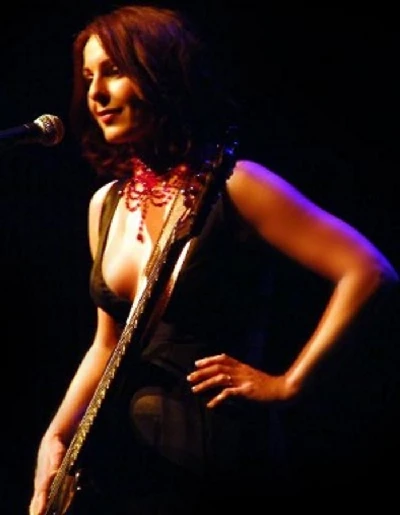
|
| Nick Dent-Robinson finds much to enjoy at Sam Brown's annual pre-Christmas International Ukulele Club show at the Kenton Theatre on Henley-on-Thames |
most viewed articles
current edition
Carl Ewens - David Bowie 1964 to 1982 On Track: Every Album, Every SongArmory Show - Interview with Richard Jobson
Colin Blunstone - Thalia Hall, Chicago, 16/7/2025
John McKay - Interview
Visor Fest - Valencia, Spain, 26/9/2025...27/9/2025
Bathers - Photoscapes 1
Billie Eilish - O2 Arena, London, 10/7/2025
Loft - Interview
Robert Forster - Interview
Sir Tim Rice - Interview
previous editions
Heavenly - P.U.N.K. Girl EPManic Street Preachers - (Gig of a Lifetime) Millennium Stadium, Cardiff, December 1999
Beautiful South - Ten Songs That Made Me Love...
Oasis - Oasis, Earl's Court, London, 1995
Prolapse - Interview
Peter Perrett - In Dreams Begin Responsibilities Interview Part One
Coldplay - Wembley Arena. London, 16/8/2022
Boomtown Rats - Ten Songs That Made Me Love....
Trudie Myerscough-Harris - Interview
Pixies - Ten Songs That Made Me Love...
most viewed reviews
current edition
Sick Man of Europe - The Sick Man of EuropeDavey Woodward - Mumbo in the Jumbo
Amy Macdonald - Is This What You've Been Waiting For?
Lucy Spraggan - Other Sides of the Moon
Phew, Erika Kobayashi,, Dieter Moebius - Radium Girls
Suzanne Vega - Flying With Angels
Bush - I Beat Loneliness
Blueboy - 2
Alice Cooper - The Revenge of Alice Cooper
Cynthia Erivo - I Forgive You
related articles |
|
Pete Brown: Interview (2015 |
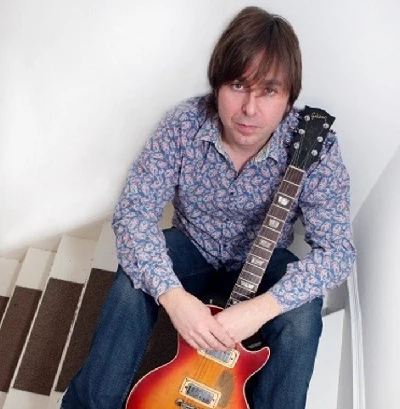
|
| Nick Dent-Robinson talks to acclaimed producer and musician Pete Brown, who is the son of Joe Brown and the brother of Sam Brown, about his acclaimed new band the NewGrass Cutters, who play bluegrass covers of classic rock songs |
Pennyblackmusic Regular Contributors
Adrian Janes
Amanda J. Window
Andrew Twambley
Anthony Dhanendran
Benjamin Howarth
Cila Warncke
Daniel Cressey
Darren Aston
Dastardly
Dave Goodwin
Denzil Watson
Dominic B. Simpson
Eoghan Lyng
Fiona Hutchings
Harry Sherriff
Helen Tipping
Jamie Rowland
John Clarkson
Julie Cruickshank
Kimberly Bright
Lisa Torem
Maarten Schiethart